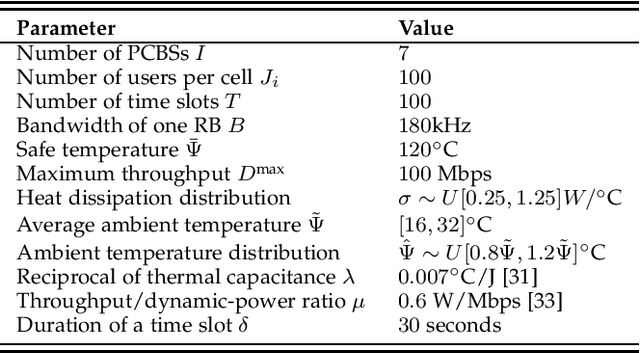Zhanwei Yu
Online Learning for Intelligent Thermal Management of Interference-coupled and Passively Cooled Base Stations
Oct 11, 2024



Abstract:Passively cooled base stations (PCBSs) have emerged to deliver better cost and energy efficiency. However, passive cooling necessitates intelligent thermal control via traffic management, i.e., the instantaneous data traffic or throughput of a PCBS directly impacts its thermal performance. This is particularly challenging for outdoor deployment of PCBSs because the heat dissipation efficiency is uncertain and fluctuates over time. What is more, the PCBSs are interference-coupled in multi-cell scenarios. Thus, a higher-throughput PCBS leads to higher interference to the other PCBSs, which, in turn, would require more resource consumption to meet their respective throughput targets. In this paper, we address online decision-making for maximizing the total downlink throughput for a multi-PCBS system subject to constraints related on operating temperature. We demonstrate that a reinforcement learning (RL) approach, specifically soft actor-critic (SAC), can successfully perform throughput maximization while keeping the PCBSs cool, by adapting the throughput to time-varying heat dissipation conditions. Furthermore, we design a denial and reward mechanism that effectively mitigates the risk of overheating during the exploration phase of RL. Simulation results show that our approach achieves up to 88.6% of the global optimum. This is very promising, as our approach operates without prior knowledge of future heat dissipation efficiency, which is required by the global optimum.
D2D-Assisted Mobile Edge Computing: Optimal Scheduling under Uncertain Processing Cycles and Intermittent Communications
Sep 08, 2023



Abstract:Mobile edge computing (MEC) has been regarded as a promising approach to deal with explosive computation requirements by enabling cloud computing capabilities at the edge of networks. Existing models of MEC impose some strong assumptions on the known processing cycles and unintermittent communications. However, practical MEC systems are constrained by various uncertainties and intermittent communications, rendering these assumptions impractical. In view of this, we investigate how to schedule task offloading in MEC systems with uncertainties. First, we derive a closed-form expression of the average offloading success probability in a device-to-device (D2D) assisted MEC system with uncertain computation processing cycles and intermittent communications. Then, we formulate a task offloading maximization problem (TOMP), and prove that the problem is NP-hard. For problem solving, if the problem instance exhibits a symmetric structure, we propose a task scheduling algorithm based on dynamic programming (TSDP). By solving this problem instance, we derive a bound to benchmark sub-optimal algorithm. For general scenarios, by reformulating the problem, we propose a repeated matching algorithm (RMA). Finally, in performance evaluations, we validate the accuracy of the closed-form expression of the average offloading success probability by Monte Carlo simulations, as well as the effectiveness of the proposed algorithms.
 Add to Chrome
Add to Chrome Add to Firefox
Add to Firefox Add to Edge
Add to Edge